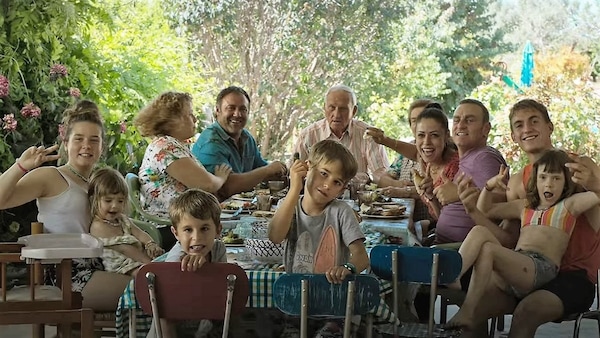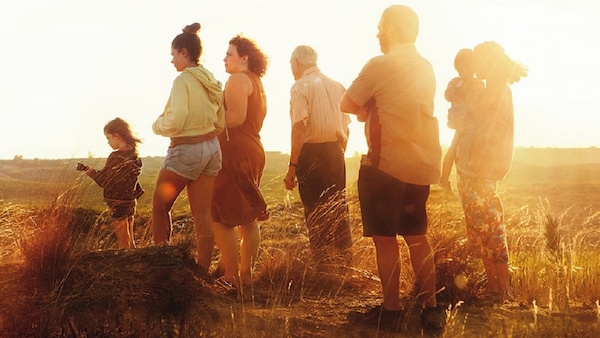Newsletter | Alcarràs: A Beautifully Observed Portrait Of Farmers Defying Modernity
In Carla Simón’s Alcarràs, a family of peach farmers fight for their land, and their future. Prahlad Srihari reviews.

Last Updated: 04.36 PM, Apr 05, 2023
This column was originally published as part of our newsletter The Daily Show on March 1, 2023. Subscribe here. (We're awesome about not spamming your inbox!)
***
CARLA SIMÓN'S second feature Alcarràs opens with a scene which serves as both a prelude and a premonition. On a summer afternoon, at the edge of a peach orchard in the Catalan countryside, three children play make-believe inside an abandoned jalopy that doubles as their spaceship. For Iris (Ainet Jounou) and her twin cousins Pere (Joel Rovira) and Pau (Isaac Rovira), the jalopy is their sanctum, a safe space to seek refuge from the hot sun and let their imaginations run wild. On their latest adventure, the kids fear they may have journeyed too close to the sun and run into aliens. Until their extra-terrestrial frolic is disrupted by a more earthly threat: an excavator whose operator urges the kids to get out so he can remove the car and clear the field for solar panels to be installed. As the long hydraulic claw extends like a monster’s talon to take their piece of paradise away, all the kids can do is watch on. For nothing can stop the forward march of progress.

PROGRESS IS PARAMOUNT, suggests received wisdom. Economic growth may be wildly uneven from country to country, from city to village, from neighbourhood to neighbourhood. But the narrative widely accepted is: the technological advancements brought forth by the Industrial Revolution have made our lives easier and transformed once-agrarian societies for the better. Carla Simón ambiguates this narrative by asking what progress means for those left behind and those left playing catch-up when progress outpaces their ability to adapt. For a family of peach farmers in Alcarràs (from which the film takes its title), the arrival of the excavator forebodes the loss of tradition, identity and livelihood. We hear the roar of the vehicle before we see it, making the external forces of change it represents all the more foreboding.
When Iris, Pere and Pau rush home to share the bad news with their family, we find a household already on edge. The Solé family are faced with the threat of being uprooted from the land where they have lived, made their home and grown peaches for three generations. The threat of displacement sows fear and strife, but also defiance through a final harvest. By pitting a family of farmers against the capitalist structures of mass production, Alcarràs presents a socioeconomic snapshot of the challenges faced by farmers in many parts of the world.
For the second time in two features, Simón draws elements from her own life. Both are “emotionally autobiographical”, as Charlotte Wells described her own Aftersun. Where Summer 1993 was inspired by Simón’s personal memories as a six-year-old girl coping with the loss of her parents to AIDS, Alcarràs takes inspiration from her adoptive mother’s family. Simón invites us into the daily lives of the Solés as they eat, drink, bicker and pick ripe peaches together. The honeyed compositions of the sun-kissed groves may lend themselves to easy romanticisation of farm life, but this is far from a pastoral idyll, as Simón reminds us with shots of pesky rabbits and encroaching cranes. The heavy machinery and the solar panels are filmed from a distance, often across a stream of river, to show a family content to stay behind the times. The stream, like a frontier between yesterday and tomorrow, seems to insulate the Solés from the world outside.
Long before the Solés’ bucolic bubble burst, we learn the land was currency given to them in a verbal agreement for sheltering the landowner’s family, the Pinyols, during the Spanish Civil War. The Pinyols’ descendant Joachim (Jacob Diarte) reneges on the agreement, knowing the Solés have no legal recourse without a written contract. Each generation responds to the crisis in a different way because the land carries a different meaning for each of them. For grandpa Rogelio (Josep Abad), it is his family’s legacy. So, he tries to stop his family’s eviction by gifting the Pinyols a basket of figs as a symbolic reminder of their families’ shared history and deep bond. For his teenaged grandson Roger (Albert Bosch), the land offers a stopgap job and a side hustle (secretly growing cannabis with his uncle) till he figures out his future.
For Rogelio’s son and Roger’s father Quimet (Jordi Pujol Dolcet), the land represents his familial responsibilities. It is how he keeps everyone clothed and fed. So, he gets to work in a desperate race to maximise the summer harvest. After all, a farmer is only as successful as his last yield. The family and the odd migrant worker lend a hand. But the weight of the burden rests on Quimet’s shoulders and manifests in chronic back pain. His stubborn opposition to change and refusal to accept defeat over a losing battle leads to friction within the extended family. Meanwhile, his wife Dolors (Anna Otin) brings some measure of stability to the household.
Amidst the growing tension and uncertainties, Simón still finds room for light-hearted family fun: moms and dads push each other into the pool, Quimet wins a drinking contest, his daughter Mariona (Xènai Roset) learns a dance routine, and children puts on a play called “Jasmine and Pocahontas”. Each of these moments feel real and unrehearsed. As do the conflicts and reconciliations, whose seeds germinate so organically. Put together, the moments form a convincing portrait of an extended family.
In an ensemble of non-professional actors, Simón finds the most natural anchors in the children. Their innocence softens the film’s hard edges of anger and despair. Their powerlessness — observing the world but not having control over it — puts us in the same position, allowing us to engage with the reality of the film more deeply. Their sweetness makes the Solés realise that even if they lose their land, their traditions and their livelihood, as long as the family stays together, there is hope yet that everything will be peachy-keen.
Alcarràs is now streaming on MUBI.
